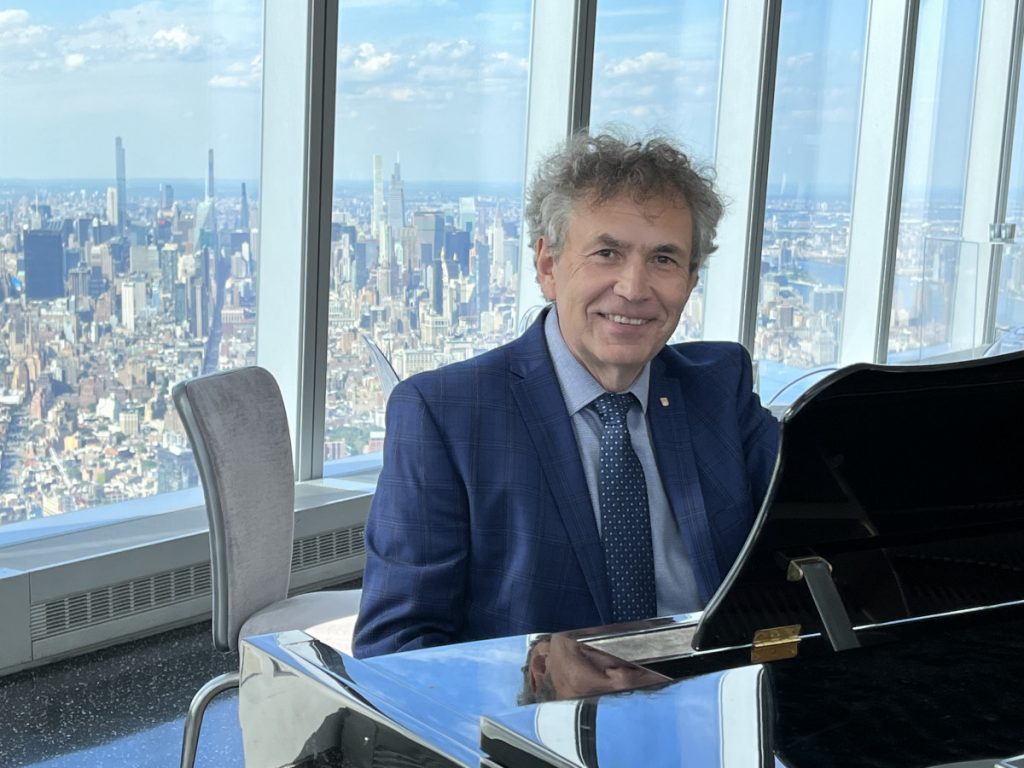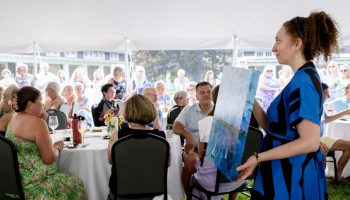
Deborah Trefts
Staff writer
Ukraine continues to exist as an independent nation state – and that is a testament to the resilience of its people.
Throughout its long and storied history, conquerors have coveted its fertile and resource-rich lands. They have sought access to the Azov and Black Seas, as well as the Mediterranean and Baltic Seas via Ukraine’s 23,000 or so rivers. Geopolitically, it has also served as an East-West buffer.
Resistance, therefore, has been a cultural imperative.
Concert pianist, ethnomusicologist and Ukrainian history lecturer Taras Filenko will curate a special performance titled “Music, Poetry, War: A History of Ukrainian Resistance” at 4 p.m. on Sunday at the Chautauqua Women’s Club House. Tickets are available at chautauquawomensclub.org
This is one of a number of events – concerts focusing on the work of Ukrainian composers and speaking engagements about the history of Ukrainian musical culture – which Filenko has been undertaking since Russia invaded Ukraine in February 2022. He has raised hundreds of thousands for Ukrainian charities providing humanitarian relief for the Ukrainian people.
Filenko said that the Chautauqua Women’s Club performance is dedicated to David Yakushin, a 22-year-old violinist who was inspired by Filenko to pursue music as his profession. During his final year at the Tchaikovsky National Music Academy of Ukraine in Kyiv, in February 2022, Yakushin volunteered with Ukraine’s defense forces.
“I met (David) five years ago after one of my concerts in Ukraine,” Filenko said. “He came to the first, and then the next, with his mother. He was a quiet young man. His mother sent me a letter that he was so impacted by my events that he was becoming a professional violinist. He was killed last Friday.”
So many artists, poets and sons have been killed since the Russia-Ukraine War began, Filenko said, that every Ukrainian family has been affected, including his own. Two nephews volunteered at the beginning of the war. Since then, his 61-year old cousin has been sleeping in his bathtub because it’s the safest place in his home in Kyiv. He hears the noises caused by Russian drones nightly.
Filenko said at the CWC House, he will perform music from the late 18th century by composer, conductor and harpsichordist Dmytro Bortniansky, who was a contemporary of Ludwig Van Beethoven. Of Ukrainian Cossack origin, Bortniansky served at the court of Catherine the Great. He composed Ukraine’s earliest opera, symphony and violin sonata.
Music from the Romantic era, spanning from about 1798 to 1837, will also be included. In particular, Filenko will showcase Ukrainian composer, pianist, conductor and ethnomusicologist Mykola Lysenko (1842-1912) of the late Romantic period.
Lysenko was so versatile, prolific, and central to the Ukrainian music of his time that Filenko and his late mother, Tamara Bulat, co-authored The World of Mykola Lysenko: Ethnic Identity, Music Culture and Politics in Nineteenth-Century Ukraine. It was first published in English in 2001, and again eight years later in Ukrainian.
Filenko’s mother was a Ukrainian-American musicologist and professor of folklore and ethnology, and a world-renowned author who co-wrote the six-volume book, The History of Ukrainian Music, and his father was a space scientist. Together they lived in the city of Zaporizhzhia, located along the banks of the Dnieper River in southeastern Ukraine.
At the Tchaikovsky National Music Academy, Filenko earned a master’s degree in piano performance. He also became an organist. After winning first prize in the Ukrainian National Concerto Competition in 1982, he received the First Degree Baltic State Award for Contemporary Musicians the following year.
Other awards followed, and in 1986 he was appointed by the Music Academy to teach courses in Ukrainian music, piano and piano literature. He also lectured on the history of Ukrainian music for five years.
After completing his doctorate degree in music history (historic musicology) at the Music Academy in 1989, Filenko became the Associate Dean of Conducting and Voice.
As a Fulbright Research Post-Doctoral Fellow from Ukraine in 1993, he said he studied at Rutgers and Columbia universities. Five years later, he graduated from the University of Pittsburgh with a second doctorate degree, this one in ethnomusicology.
“I had planned to get my Ph.D. and open a department (of ethnomusicology) in Ukraine, but when I returned in 1998-1999, the economy was horrible,” Filenko said.
Heading back to Pittsburgh, he joined the faculty of the City Music Center of Duquesne University, which since 1989 has served as the Mary Pappert School of Music’s community outreach division. CMC faculty members provide music instruction to students regardless of their age.
A lifelong learner himself, Filenko also earned an Executive Master of Business Administration at Carnegie Mellon University.
Although he has continued teaching at CMC, in 2014, Filenko was awarded an unusual second Fulbright scholarship. This time he reversed direction, going from the United States to Ukraine. There, he introduced the virtually unknown field of ethnomusicology in a number of cities through concerts and curricula.
For more than 40 years, Filenko has been working in the fields of music history, ethnomusicology and music performance (piano, organ and choir directing). Throughout North America and Europe, he has been presenting concerts and making media appearances to promote music by contemporary Ukrainian composers. He has also been participating in musicological conferences and international symposiums.
“Music plays a very large role because of the subjugation of Ukraine, (including) the schools, language, theater and government,” he said. “Music is a way that history can be enhanced, (by) incorporating into art melody and tunes without being censored by authority.”
After Russia invaded Ukraine, Filenko asked film, television and dance composer Michael Minard to write a piece about the country under siege. Minard responded with “Ukraine Triptych,” which he wrote for both violin and piano.
This “is my response to the humanitarian crisis we are witnessing daily in Ukraine,” Minard stated on his website. “A violin sonata in three movements, Ukraine Triptych is dedicated to the struggle of the Ukrainian People. 1. Міць (Strength) 2. Втрата (Loss) 3. Відсіч (Resistance). Pictures of Ukraine from before and during the conflict provide a visual accompaniment.”
On Sunday, Filenko and violinist Jennifer Orchard will be bringing “Ukraine Triptych” to life. Orchard is first violinist with the Pittsburgh Symphony Orchestra, and a founding member of the Clarion Quartet, which presents works created by suppressed composers. She is also a former member of the world-renowned Lark Quartet. Having taken up and excelled at the fiddle, Orchard has performed and recorded with singer-songwriter Andrew Lipke.
“I can’t cover the whole history of Ukraine in one hour,” Filenko said. “I’m going to bring books (including The World of Mykola Lysenko). On the slides there will be information. I’ll also bring folk instruments. (And I’ll) present a poem.”
Sunday’s performance will include 40 to 45 slides of Ukrainian art, culture, ancient instruments and photographs with Elsa Limbach – a Pittsburgh-based arts educator, choreographer, dancer and former Fulbright scholar in Bulgaria – contributing her family history.
“I focus on the town my grandmother was born in, in western Ukraine,” she said. “It’s seen so much historical change. She was born in 1897 when it was part of the Russian Empire. Just a few miles away was the border of the Austro-Hungarian Empire. … We use it as a parable. In my grandmother’s memory, it was a very peaceful place.”
Limbach said her grandmother’s town and family history relate to the musical pieces that will be performed Sunday.
“Ukrainian music is not well known outside Ukraine because of repression by the Russian Empire, the Soviets, (and the Germans during WWI and WWII),” she said.
Filenko said without support, the war between Russia and Ukraine could expand into a larger conflict.
“This isn’t just a local war,” he said. “It could be the size of World War I or World War II. Without support, Ukraine wouldn’t be able to withstand this enemy. It’s not a war of resources. It’s an assault not just on democracy, but on moral values. Rape and tragedy is associated with the Russian army. It’s not just taking land. They demolish everything – theaters, schools, hospitals.”
It is important to Limbach that people remember what’s happening to Ukraine, support Ukraine financially if they can, and “reach out to political figures and tell them that Ukraine matters … (that) it’s an investment in a more democratic world.”
Because Ukraine’s history is not well known, she said, “people think Ukraine isn’t a distinct cultural space. … Its history has often been repressed, (yet) there is a real Ukrainian history. Well before Russia was a state, in its mythology they tried to declare that Ukraine was theirs.”




